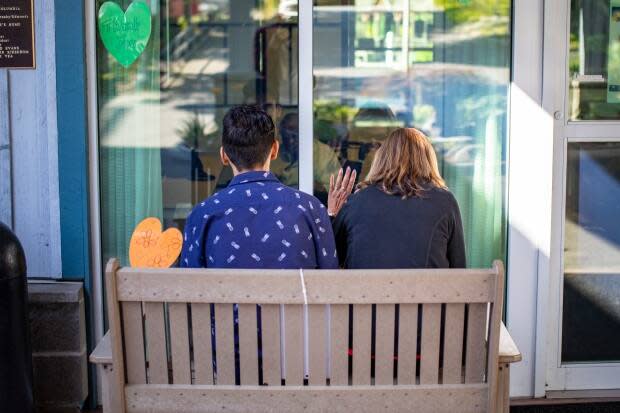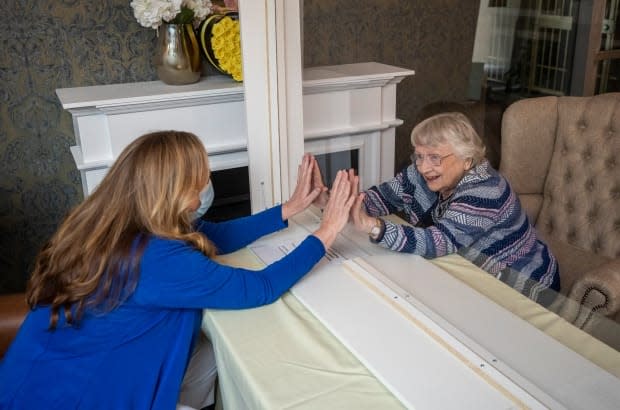Visitors to B.C. care homes deemed 'essential' move to front of vaccine line — others wait and worry

Jody Vance said her heart skipped a beat when she got an unexpected phone call from the long-term care facility where her elderly father lives.
She braced herself for bad news, but instead the voice on the other end told her something so many Canadians would love to hear: a dose of the Pfizer-BionTech COVID-19 vaccine was being set aside for her.
"It was kind of was a little bit surreal," she said. "It felt like hope."
Vance got the shot because staff at the long-term care facility in Delta, B.C., declared her an "essential" visitor for her 82-year-old father. Driving him to emergency cancer surgeries during the pandemic made her eligible for such status.
To Vance, the main benefit of being vaccinated is that her dad won't need to be isolated from her for his own protection. B.C. is one of the few provinces — Ontario and Nova Scotia are taking a similar approach — ushering essential visitors to the front of the vaccine line as a priority group. It's up to the discretion of each facility to determine who is considered essential.
There is no cap in B.C. on the number of approved essential visitors, but only one will be allowed at a time with exceptions made for end-of-life care.
Those left to wait say they are also left to wonder if the delay could ultimately be too long.

A frustrating process
"I don't know how long she'll be with us," said Niovi Patsicakis, speaking about her 98-year-old mother, who lives at Evergreen Long-Term Care in White Rock.
Patsicakis said her mom has been mostly confined to her room in the facility for nearly three months, and Patsicakis hasn't been able to visit since before Christmas. She said she fears the lack of in-person mother-daughter visits has affected her mom's health.
But unlike Vance, Patsicakis said she has not been deemed essential by her mom's long-term care facility.
According to the B.C. Centre for Disease Control (BCCDC), essential visits include those for compassionate care reasons such as critical illness, hospice care, end of life and medical assistance in dying. They can also include visits by a person who assists with feeding, mobility and communication needs.
WATCH | British Columbians with loved ones in long-term care talk about their experiences trying to get vaccine priority:
The B.C. Health Ministry has also said a clergy member can be designated as an essential visitor.
Health authority and facility staff, in collaboration with the long-term care resident, determine who gets essential visitor status, according to BCCDC in guidelines published on Jan. 7.
Patsicakis' visits in the past have tended to be social in nature, but Patsicakis said her mother's health seems to be deteriorating since their loss of contact.
"I can see a huge difference in how mom has gotten much worse," said Patsicakis. "Her language skills have weakened as well as her mood. Sometimes, she's confused or doesn't want to get out of bed."
Trying to get an essential designation has been difficult and frustrating, she said.

Patsicakis said essential visitors to Evergreen are evaluated by a group that includes facility faculty and a representative from the local health authority, Fraser Health. She said she wrote Evergreen administration three times to plead her case and filed a complaint with an advocate at the health authority's patient quality care office.
She said she requested Evergreen's decision be sent to her in writing in November and never received it. As of Jan. 20, she said hadn't heard anything from Fraser Health either.
"I know so many people are devastated," she said, adding she is part of a social media group of others like herself who are supporting one another as best they can.
The National Institute on Ageing said families in British Columbia are enduring the most restrictive long-term care home visitation policies in the country.

B.C. Seniors Advocate Isobel Mackenzie said the lack of an association that represents residents and their families at the 300 care homes in B.C. means they don't have a voice in policy discussions between the government and care-home operators.
She said care home operators seem to be arbitrarily deciding who qualifies as an essential or designated visitor.

Dr. Bonnie Henry, B.C.'s provincial health officer, provided the latest numbers of people who had qualified as essential visitors during a press event on Jan. 18.
Henry said about 8,000 people have met the criteria and will receive a vaccination during the province's first phase of a four-phase immunization program, which is underway. There are approximately 30,000 people living in long-term care facilities
"The default, we believe, should be that every person, every resident who has a person who can care for them, should have a designated essential visitor, but that has been a challenge to operationalize," said Henry.
Applications for essential status are available on the provincial health ministry's website. There is an appeal process for people who do not like the initial decision.
One Abbotsford long-term care home operator said the more people who are designated essential, the better.
"Because of staffing levels, this gives us that extra layer of assistance — they are doing things like supporting their loved one with feeding or mobility," said Dan Levitt, executive director of Tabor Village. "So they need that vaccine, and that'll make a big difference for all of us."

During a Friday press briefing, B.C. Health Minister Adrian Dix addressed the frustration felt by people disappointed to hear they are not considered essential.
"Everyone should feel that their participation, their social life, their visiting of their loved ones is essential," he said.
Dix said vaccinating residents and staff in long-term care and assisted living facilities now could lead to eased restrictions around social visits by March, when all residents and staff are expected to have received both doses of their vaccines.
"It's going to allow a lot of things to happen, including more visits from family members and loved ones and friends," he said.

